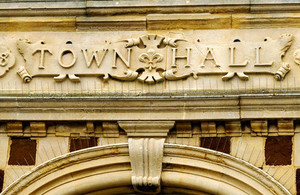Press freedom boosted by new 'right to report'
New law now allows press and public to film, tweet and blog town halls.

Town hall
In a boost for local democracy and the independent free press, councils in England were brought into the 21st century today (6 August 2014) after Local Government Secretary, Eric Pickles, signed a Parliamentary order allowing press and public to film and digitally report from all public meetings of local government bodies. This ‘right to report’ updates a law passed by Margaret Thatcher as a backbench MP.
Following the passage of both primary and secondary legislation, the move opens councils’ digital doors, covering broadcasters, national press, local press, bloggers and hyper-local journalists and the wider public. The new law aims to end active resistance amongst some councils to greater openness. Councils have even called the police to arrest people who tried to report, tweet or film council meetings, or claimed spurious ‘health and safety’ or ‘reputational risks’ to digital reporting.
This new law builds on Margaret Thatcher’s successful Private Members’ Bill from 1960 which allowed for the written reporting of council meetings by the press. The new rules will apply to all public meetings, including town and parish councils and fire and rescue authorities.
Local Government Secretary, Eric Pickles, said:
Half a century ago, Margaret Thatcher championed a new law to allow the press to make written reports of council meetings. We have updated her analogue law for a digital age.
Local democracy needs local journalists and bloggers to report and scrutinise the work of their council, and increasingly, people read their news via digital media. The new ‘right to report’ goes hand in hand with our work to stop unfair state competition from municipal newspapers - together defending the independent free press.
There is now no excuse for any council not to allow these new rights. Parliament has changed the law, to allow a robust and healthy local democracy. This will change the way people see local government, and allow them to view close up the good work that councillors do.
Further information
New rights
The government has published a plain English guide of practical information on how the public can exercise their new rights, and what they should expect from their local government bodies.
The Openness of Local Government Regulations 2014, which apply to England, give rights to members of the press and public to:
- use modern technology and communication methods such as filming, audio-recording, blogging and tweeting to report the proceedings of the meetings of their councils and other local government bodies
- see information relating to significant decisions made outside meetings by officers acting under a general or specific delegated power
Case studies
- a councillor in Thanet was removed by the police for trying to film a council meeting discussing airport expansion
- Wirral Council said filming a planning committee would compromise ‘health and safety’.
- Tower Hamlets Council barred a 71 year old resident from filming due the risk of ‘reputational damage’ to the authority
- Keighley Town Council blocked residents filming as it would amount to a ‘breach of standing orders’
- Bexley Council said audio and visual filming would breach its ‘agreed protocol’
- Stamford Town Council placed a ban on journalists tweeting from meetings due to the risk of them ‘not accurately portraying a debate’
- a blogger in Huntingdonshire was removed by police for filming, and has advised fellow bloggers to ‘be prepared for the police to be called and the possibility of arrest’
Margaret Thatcher’s 1960 law
The Public Bodies (Admission to Meetings) Act 1960 was a successful Private Members’ Bill by new backbencher, Margaret Thatcher MP; this Act allowed the written reporting of council meetings.
Office address and general enquiries
2 Marsham StreetLondon
SW1P 4DF
Contact form https://www.gov.uk/gui...
General enquiries: please use this number if you are a member of the public 030 3444 0000
If your enquiry is related to COVID-19 please check our guidance page first before you contact us - https://www.gov.uk/guidance/coronavirus-covid-19-guidance-for-local-government.
If you still need to contact us please use the contact form above to get in touch, because of coronavirus (COVID-19). If you send it by post it will not receive a reply within normal timescale.
Media enquiries
Email newsdesk@communities.gov.uk
Please use this number if you are a journalist wishing to speak to Press Office 0303 444 1209